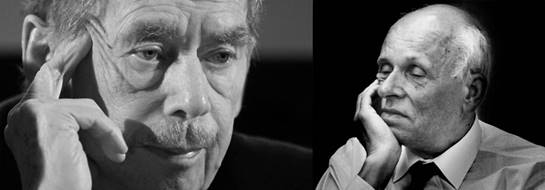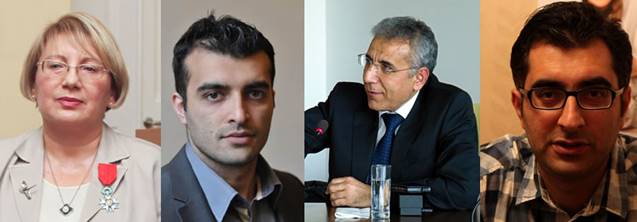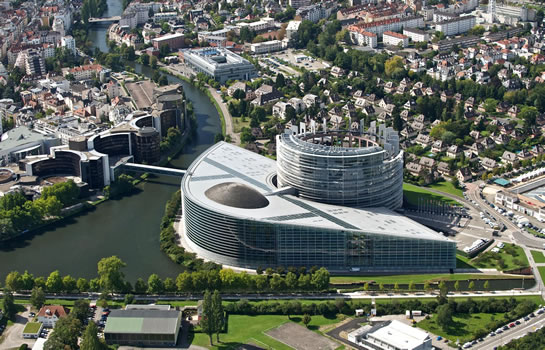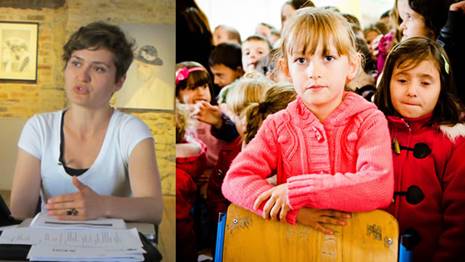The LIST and arrests in Baku – Sakharov prize 2014 – Black Sea in Budapest – Capacity building in Kosovo
 |
|
|
Vaclav Havel – Andrei Sakharov |
|
- THE LIST
- Human Rights Defenders as Targets
- Havel and Sakharov – prizes and signals
- Black Sea in Budapest
- Capacity Building in Pristina
Dear friends,
While Russian efforts to destabilize Ukraine have intensified throughout the summer, authorities in Azerbaijan have likewise continued to challenge the fundamental norms of post-Cold War Europe. Russia has made a mockery of numerous European conventions and obligations. Azerbaijan has made a mockery of the Council of Europe and its role in defending the European Convention on Human Rights.
In May 2014, Azerbaijan assumed the chairmanship of the Council of Europe (CoE). Expectations were low, for many good reasons. And yet, what happened next was worse than imagined. During the summer, hiding behind the war in Ukraine and its own recently attained chairmanship of the CoE, Azerbaijani authorities unleashed an unprecedented wave of repression, targeting opposition politicians, journalists, civil society representatives, and human rights defenders. See here:
THE LIST
 |
|
|
Leyla Yunus – Rasul Jafarov – Intiqam Aliyev – Anar Mammadli |
|
Over the last year, many of the most prominent human rights defenders in Azerbaijan came together to produce a list. They knew what they were doing was dangerous. They also felt that it had to be done – it is a list of political prisoners, which exposes the discrepancy between Azerbaijan's human rights obligations and the systematic violation of these commitments that is occurring today.
A working group led by Leyla Yunus and Rasul Jafarov met a number of times leading up to this summer, and applied the definition of “political prisoner” that was adopted by the Council of Europe in 2012, to nearly one hundred Azerbaijanis jailed for political reasons:
The List of 98 Political Prisoners – in English
The list also revealed just how nervous and aggressive the authorities have become. Even before an English translation of the list could be published, Leyla Yunus, Rasul Jafarov, and prominent lawyer and human rights defender Intiqam Aliyev were themselves arrested.
And in a bitter irony that reveals so much about Azerbaijan today, they are now included in the very list they helped create. Next to Anar Mammadli, who had been advising the Council of Europe rapporteur on political prisoners in 2012, and who had already been sentenced to more than five years in jail earlier in 2014.
Human Rights Defenders as Targets
The targeting of those who document human rights violations in Azerbaijan is in fact reminiscent of the fate of previous generations of dissidents and human rights defenders in autocratic regimes: it conjures memories of the signatories of Charter 77, the Committee for the Defense of the Unjustly Prosecuted or the Polish Workers Defence Committee in communist Central Europe.
Back in the 1970s the playwright and activist Vaclav Havel, author of Charter 77, wrote:
"We never decided that we would go to jail. In fact, we never decided to become dissidents... we simply went ahead and did certain things that we felt we ought to do, and that seemed to us decent to do, nothing more nor less."
Leyla Yunus, Rasul Jafarov, Intiqam Aliyev, and Anar Mammadli represent the same tradition of doing "what is decent," and speaking out for the rights of others. For this they are paying a very high personal price. Leyla Yunus (whose husband Arif is also in jail) is in bad health.
Conditions in prisons in Azerbaijan are terrible. It now appears that the authorities in Baku are no longer even worried about the possibility of some of their prominent prisoners dying in jail. And yet, none of this would be apparent to a casual visitor of this website: the homepage of the Council of Europe, proudly presenting the initiatives by the curremt chairmanship: Azerbaijan.
Havel and Sakharov – prizes and signals
 |
|
|
European Parliament |
|
We believe that it is in the interest of democrats across Europe to preserve respect for human rights and for the European Convention on Human Rights. Human rights defenders like Leyla, Rasul, Intiqam, and Anar defend our common heritage.
For this reason, a number of international NGOs have recently launched an effort to promote Leyla Yunus, Rasul Jafarov, and Intiqam Aliyev as candidates for the European Parliament's Sakharov Prize in 2014.
If you want to learn more go here: Standing Up for European Values
To learn how this prize is awarded and how you can help – and which MEPs to contact in the next days (!) – please go here: ESI Briefing - How the Sakharov Prize 2014 is awarded – Contacts
The European Parliament should send a strong signal to a region vital to the rest of Europe; at a moment when both Russian tanks and Azerbaijani prosecutors are trying to tear up the norms and values on which today's European order is built.
Also, on 26 August 2014 the selection panel of the Václav Havel Human Rights Prize announced its three finalists. This prize is awarded by the Parliamentary Assembly of the Council of Europe (PACE) in partnership with the Václav Havel Library and the Charter 77 Foundation. And one of the three finalists was Azerbaijani human rights activist and independent election monitor, Anar Mammadli.
Anar Mammadli learned about this decision in a prison cell. On 26 May 2014, Azerbaijan's Baku Court of Grave Crimes sentenced him to 5.5 years in jail.
Black Sea in Budapest
 |
|
|
Thomas Carothers – Ulrich Speck – Gerald Knaus – Matteo Fumagalli – Goran Buldioki –Wolfgang Reinicke |
|
2014 is a dramatic year for the Black Sea region. The conflict between Russia and Ukraine presents a challenge to the European security order – conflicts, closed borders, and rivalries weaken institutions and the rule of law. Democracy and human rights are under pressure.
We meet to discuss all of this in Budapest on 6-10 October 2014:
Workshop for Civil Society Leaders and Policy Makers from the Black Sea Region
If you are an innovative thinker or policy maker from the Black Sea region (Russia, Ukraine, Moldova, Romania, Bulgaria, Turkey, and Georgia) please join us for this event. You need to hurry though – the deadline is the end of this week. The application is here.
During the seminar Gerald Knaus and Ulrich Speck from Carnegie will look at human rights in the region, the role of the EU and the Council of Europe, international human rights NGOs and local activists, and current clashes of values. There will also be an opening debate on 6 October on “The Future of Democracy, Security and Economic Policy in the Black Sea Region” with Thomas Carothers and Gerald Knaus.
Capacity Building in Pristina
 |
If you are a Kosovar researcher, analyst or journalist, and you are interested to learn more about ESI's methodology, we invite you to join our Senior Analyst Besa Shahini on a one day Capacity Building Seminar on 13 September.
Since ESI is currently researching schools and education policy in Kosovo, the seminar will be focused on these topics as well.
ESI Pristina Capacity building seminar
The deadline for applications is Monday 8 September 2014
We look forward to hearing from you, or meeting you at some of these events.
Best regards,

Gerald Knaus
- Sakharov prize 2014 and Azerbaijan
- About Leyla Yunus, Rasul Jafarov, and Intiqam Aliyev
- Anar Mammadli and the Vaclav Havel Prize 2014
- October event on the Black Sea in 2014 in Budapest
- 13 September 2014: Pristina – Register for ESI capacity building seminar: How to set up a think tank, write policy reports and do effective advocacy?
- News: 25 August 2014: Salzburg – ESI at symposium – 1814, 1914, 2014: Lessons from the Past, Visions for the Future
- News: 28 July 2014: Berlin – Workshop on Bosnia and Herzegovina at the German MFA
